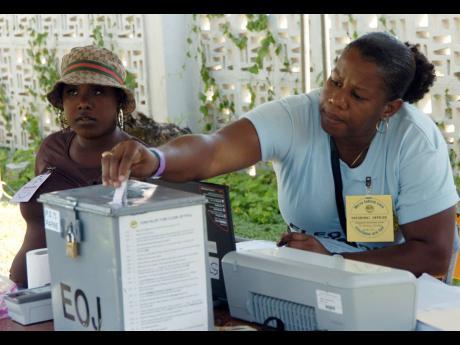Proposal for braille ballots under review
The Jamaica Council for Persons with Disabilities (JCPD) has highlighted the need for Braille ballots to better serve visually impaired voters. Director of Elections Glasspole Brown confirmed that the proposal is being considered but explained that its introduction would require changes to electoral laws as well as a detailed review of practicality and costs.
Calls grow for better access for persons with disabilities at the polls
Jamaica Gleaner/27 Aug 2025/Livern Barrett/ Senior Staff Reporter
THE GOVERNMENT-RUN entity that represents the interests of persons with disabilities is “trusting” that their experiences casting ballots in next week’s general election will be better than past polls, a top executive has indicated.
This caution comes despite a series of consultations and training sessions between the Electoral Office of Jamaica (EOJ) and the Jamaica Council for Persons with Disabilities (JCPD), both entities confirmed yesterday.
“I cannot guarantee 100 per cent that people with disabilities will not face challenges because there are also attitudinal barriers,” Dr Christine Hendricks, executive director of the JCPD, told The Gleaner yesterday.
“We are hoping that they do not because we have been part of their training and we have gone through the protocols of how you treat with persons with disabilities … words not to use, ensuring that they are not discriminatory and we have indicated how they can treat with situations as they arise,” she said.
NO DATA
There is no data indicating the total number of disabled persons who are eligible to cast ballots in the upcoming parliamentary election set for September 3, Director of Elections Glasspole Brown revealed.
However, Brown disclosed that his office has already implemented measures to address some of the issues raised by persons in the disabled community that have made life uncomfortable for them in past elections.
At the top of the list, he said, is that 98.8 per cent of all polling stations to be set up in 7,256 public school buildings across the country on election day will be on the ground floor.
Further, the director of elections noted that the Representation of the People’s Act – Jamaica’s electoral law – allows for voters who are visually-impaired to be accompanied to a polling station by a friend who will act on their behalf “based on his or her instruction in terms of marking the ballot”.
“As long as they are registered they won’t be disenfranchised,” he insisted.
“We are not there yet in terms of accommodating the disabled community, but we are moving to put a number of things in place.”
Physical access to polling stations, especially for wheelchair-bound voters, was among the complaints the JCPD was asked to raise during its consultations with the EOJ, Hendricks disclosed.
Among the critical issues from past elections, she said, is how persons with disabilities are treated by functionaries of the two main political parties when they show up to cast their ballots.
“Tending to lift people from wheelchairs and that kind of behaviour. It’s not very dignified and we really want our people with disabilities to operate with their
own private, dignity and personal space,” said Hendricks.
She said the JCPD has requested that portable ramps be provided at polling stations that do not have permanent ones in place and underscored the importance of having sign language interpreters available or on call.
“Persons can [provide] support via video, technology allows for that these days, for guidance or any direction that might be needed by the deaf person who shows up,” Hendricks reasoned, while acknowledging that it may not be practical to have an interpreter in every polling division.
Further, she said the JCPD suggested that information disseminated by the EOJ before, during and after an election should be an “easy-read” for all members of the disabled community so that, across the spectrum, persons with intellectual disabilities and persons with literacy issues can understand.
The director of elections said a suggestion by the JCPD to introduce a special ballot or Braille voting for members of the disabled community was being explored, but indicated that it would require changes to the electoral laws.
“We haven’t gone there yet in terms of the in-depth review or study of the practicality and the costing of it,” he said.
For feedback: contact the Editorial Department at onlinefeedback@gleanerjm.com.

